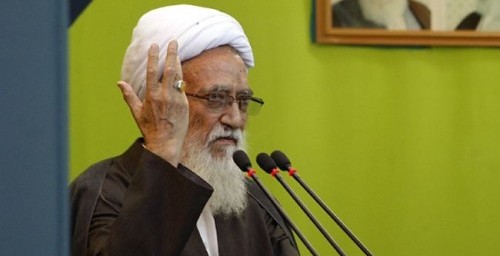PHOTO: Tehran Friday Prayer leader Ayatollah Movahedi Kermani
LATEST
The Friday Prayer in Iran’s capital Tehran took on targets at home and abroad yesterday, putting down both President Rouhani and Saudi Arabia.
Ayatollah Movahedi Kermani continued the fight over enforcement of social codes, following the announcement by Tehran’s police commander this week that 7,000 “undercover agents” will provide information to police on “crimes” such as improper dress, noise pollution, and bad driving.
Rouhani responded by repeating his comments last year chiding attempts to “take people to heaven through force and a whip”. He asserted, “We do not have the right to interfere in the public and private lives of the people except regarding the implementation of laws.”
See Iran Daily, April 21: Rouhani Criticizes Expansion of “Morality Police”
Movahedi Kermani did not directly refer to Rouhani in the prayer sermon, but he insisted that “confronting bad hijabs” — improper head covering by women — is one of the duties of police.
The cleric also took on Riyadh in the gathering tension with Saudi Arabia. He blamed the Saudis for attempting to create “discord” at last week’s Organization of Islamic Cooperation summit in Istanbul.
A communiqué by the OIC, which includes more than 50 countries, denounced Iran and Hezbollah for fostering “terrorism” and creating instability.
Kerry: US Will Not Stand in Way of Iranian Transactions With Foreign Banks
Trying to ease a dispute threatening the July 2015 nuclear deal, US Secretary of State John Kerry said on Friday that Washington will not prevent foreign banks or firms doing business with Iranian companies.
Before a second meeting in four days with Foreign Minister Mohammad Javad Zarif, Kerry said the Obama Administration was willing to further clarify what transactions are now permitted with Iran, following the removal of sanctions.
The Supreme Leader has led criticism that the US is undermining implementation of the nuclear agreement, implemented in January, by preventing Iranian financial transactions as well as not returning Iranian assets. The tension has threatened the Rouhani Government’s foreign policy of engagement, amid regime in-fighting over social and economic issues.
Meanwhile, the US Treasury has reiterated that Iran will not have access to the American financial market.
Trying to find a solution, Zarif wrote in The Washington Post that Tehran is not seeking access to the US, but wanted the Obama Administration to lift any objections to the Islamic Republic’s involvement in the global market.
Before yesterday’s meeting, Kerry urged foreign financial institutions to seek answers from US officials if they have questions, and said they should not assume that was once prohibited is still prohibited or that transactions with Iran which are illegal for US companies are illegal for foreign firms:
The United States is not standing in the way and will not stand in the way of business that is permitted with Iran since the (nuclear deal) took effect. We’ve lifted our nuclear-related sanctions as we committed to do and there are now opportunities for foreign banks to do business with Iran. Unfortunately, there seems to be some confusion among foreign banks and we want to try to clarify that as much as we can.

